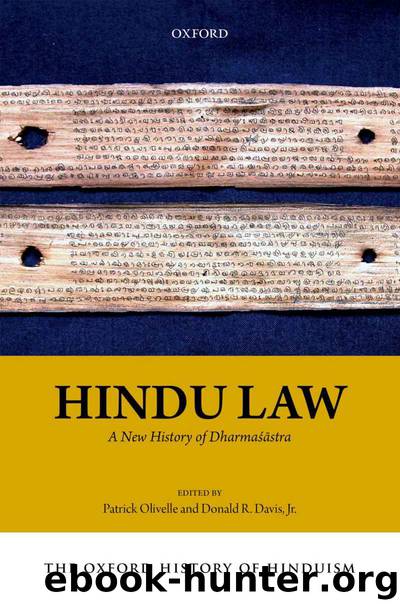The Oxford History of Hinduism: Hindu Law by Patrick Olivelle & Donald R. Davis

Author:Patrick Olivelle & Donald R. Davis [Patrick Olivelle]
Language: eng
Format: epub
ISBN: 9780198702603
Publisher: Oxford University Press
Published: 2017-12-08T07:00:00+00:00
While Nārada (following YDh 2.31 and further refined at BṛSm 1.1.58) presents these as a neat linear hierarchy, we should be cautious not to take this model as evidence of an integrated legal system. Even so, it does reveal how a jurist like Nārada thought about jurisdiction in the plural legal order of the classical period. The question we face here is how the right to punish was understood to be distributed among these various legal authorities.
The dharma texts address their instructions on vyavahāra (litigation in state courts) to the king, and they do so with reference to his unsurpassed power as chief judge and daṇḍadhara of the realm. At the same time, they recognize that this power is routinely delegated to appointees (MDh 8.9–8.11, etc.). In fact, the Arthaśāstra of Kauṭilya , our most important source from the classical tradition of statecraft, addresses its rules on vyavahāra entirely to appointed judges called dharmasthas rather than to the king (3.1.1ff.). In the dharma literature, such appointed judges are called by a few different names, such as sabhya or prāḍvivāka . All of these are the adhikṛtas in the formula above, professional judges appointed by the king. In the texts, they serve as his judicial substitutes in the fullest sense (with the exception that the king himself could overturn their rulings: YDh 2.32, etc.). So, the power to adjudicate disputes prescribed in discussions of vyavahāra is implied as much for appointed judges as for the king. Kane, following commentators such as Medhāthiti and Devaṇṇabhaṭṭa (see below), argues that the power to declare a verdict was distinct from the power to assign punishment, which remained with the king (1973: 391; cf . Jolly 1928 : 290–2). However, Bṛhaspati (1.1.91) holds that the appointed (Brāhmaṇa) judge could personally carry out two forms of punishments, verbal reprimands (vāgdaṇḍa ) and public censure (dhigdaṇḍa ), while only the king could inflict pecuniary or corporal punishment. At any rate, to the extent that an appointee could act as a full substitute, he must have had some power to rule as well as sentence. Most typically, the guilty parties are said to be handed over to the king after the verdict for punishment, whether for sentencing or simply the infliction of the punishment (NSm Mā 2.43; esp. BṛSm 1.1.88).
But, what of the right of the “lower courts,” the kula, śreṇi , and gaṇa , to punish? Bṛhaspati addresses the question directly:
kulaśreṇigaṇādhyakṣāḥ puradurganivāsinaḥ |
vāgdhigdamaṃ parityāgaṃ prakuryuḥ pāpakāriṇām || (BṛSm 1.17.17)
taiḥ kṛtaṃ ca svadharmeṇa nigrahānugrahaṃ nṛṇām |
tad rājño ’py anumantavyaṃ nisṛṣṭārthā hi te smṛtāḥ || (BṛSm 1.17.18)
The officials among families, guilds, and assemblies, dwelling in cities and fortresses, shall carry out the verbal reprimand, public denunciation, and abandonment of wrongdoers.
And, in following their individual duty, whatever favor or disfavor they confer upon men must be approved by the king himself, for they are declared to have been entrusted.
Download
This site does not store any files on its server. We only index and link to content provided by other sites. Please contact the content providers to delete copyright contents if any and email us, we'll remove relevant links or contents immediately.
Fingersmith by Sarah Waters(2518)
Kundalini by Gopi Krishna(2154)
Wheels of Life by Anodea Judith(2124)
Indian Mythology by Devdutt Pattanaik(1919)
The Bhagavad Gita by Bibek Debroy(1913)
The Yoga of Jesus: Understanding the Hidden Teachings of the Gospels by Paramahansa Yogananda(1834)
Autobiography of a Yogi (Complete Edition) by Yogananda Paramahansa(1800)
The Man from the Egg by Sudha Murty(1791)
The Book of Secrets: 112 Meditations to Discover the Mystery Within by Osho(1652)
Chakra Mantra Magick by Kadmon Baal(1631)
The Sparsholt Affair by Alan Hollinghurst(1563)
Gandhi by Ramachandra Guha(1516)
Sparks of Divinity by B. K. S. Iyengar(1511)
Avatar of Night by Tal Brooke(1507)
Karma-Yoga and Bhakti-Yoga by Swami Vivekananda(1483)
The Bhagavad Gita (Classics of Indian Spirituality) by Eknath Easwaran(1467)
The Spiritual Teaching of Ramana Maharshi by Ramana Maharshi(1420)
Hinduism: A Very Short Introduction (Very Short Introductions) by Knott Kim(1359)
Skanda Purana (Great Epics of India: Puranas Book 13) by Bibek Debroy & Dipavali Debroy(1359)
